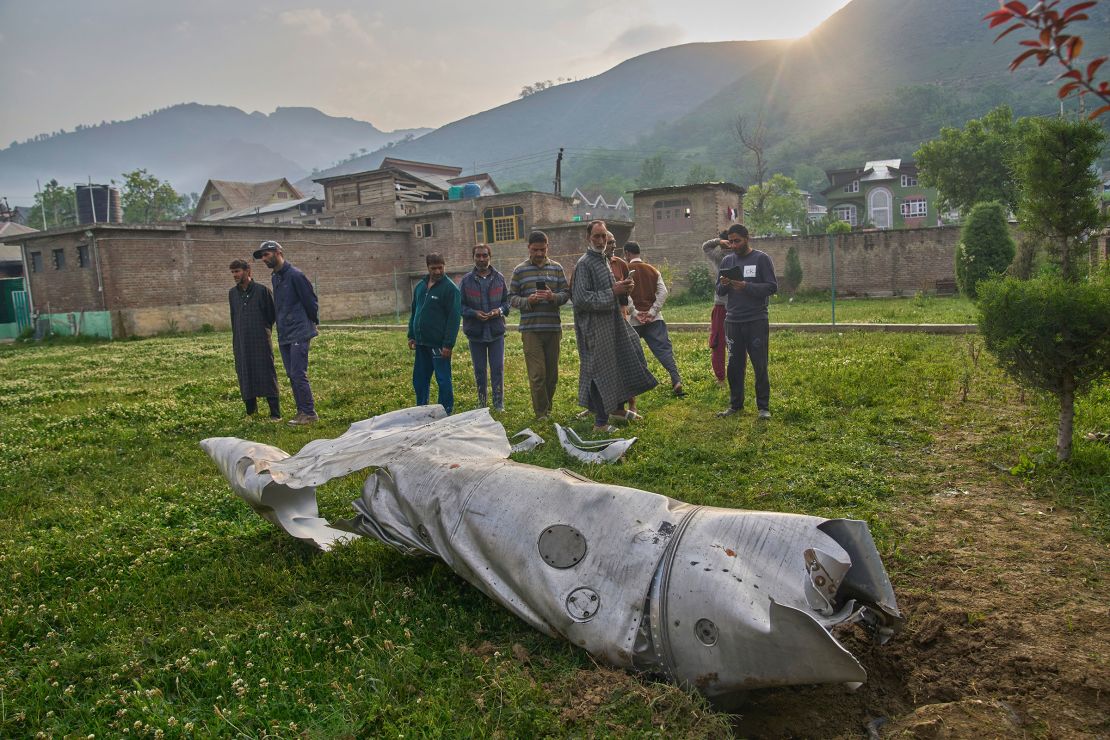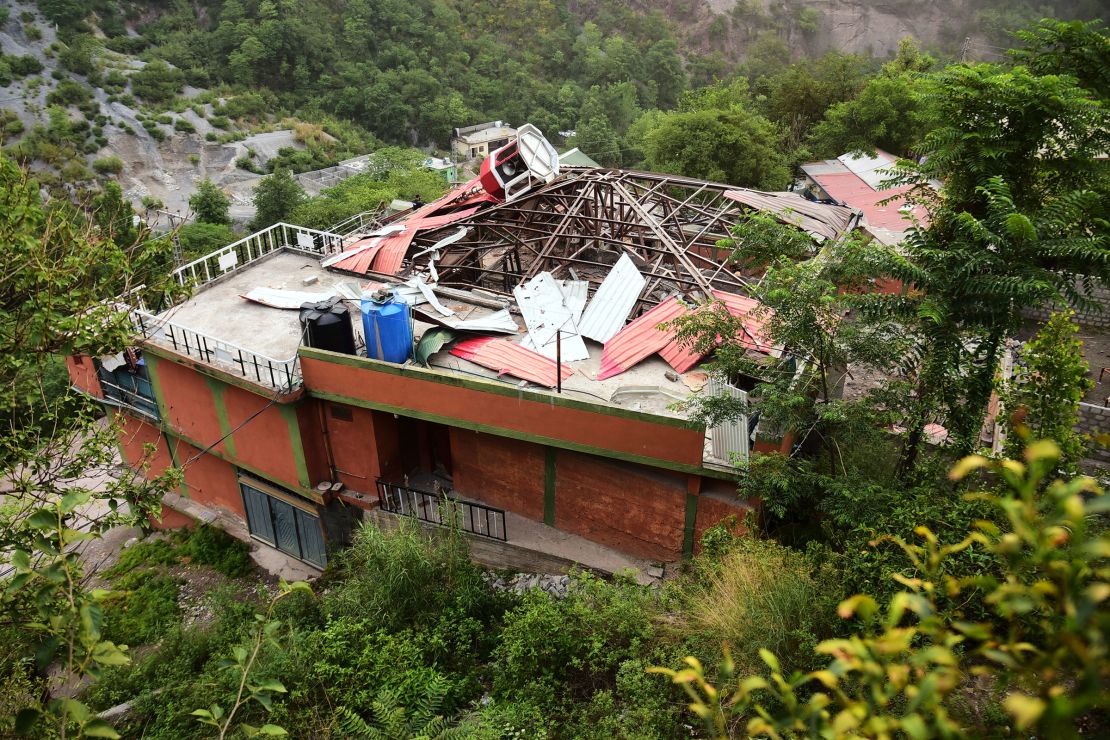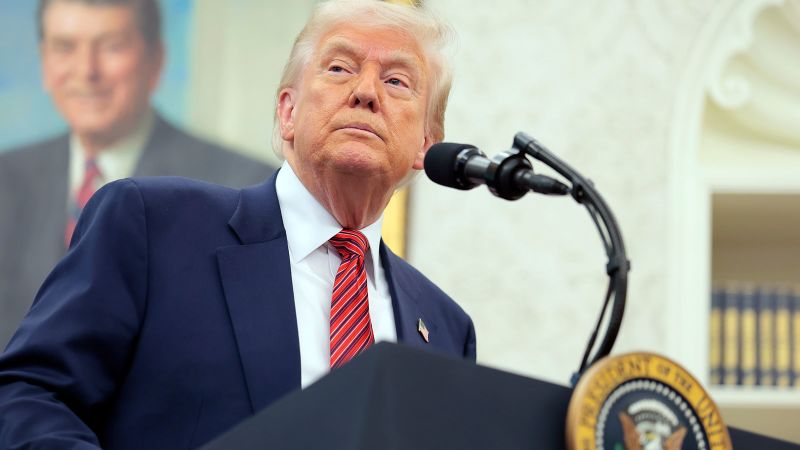CNN
—
The violent crisis between India and Pakistan is exactly the kind of international emergency that would once have prompted a full-on US diplomatic drive to cool tempers and head off a wider war.
But this latest fighting over and beyond Kashmir, the disputed Muslim-majority region, may become a test of the Trump administration’s bandwidth and limited aspirations for global convening — and for the world without American leadership.
President Donald Trump on Tuesday offered a passive initial response to the fighting, set off by a terror attack on Indian tourists that New Delhi blames on Pakistan-backed militants. “It’s a shame,” Trump said. “I just hope it ends quickly.” On Wednesday, he went a little further, offering his good offices without showing much enthusiasm for becoming involved. “I get along with both, I know both very well, and I want to see them work it out,” Trump said. “They’ve gone tit-for-tat. So hopefully they can stop now. … If I can do anything to help, I will be there.”
Secretary of State Marco Rubio has been in touch with top officials from India and Pakistan in recent weeks — and since India’s strikes deep inside Pakistani territory on Tuesday, according to the State Department. But there’s no indication so far of a broadening US effort to coordinate international mediation or crisis management.
This may be partly because the time is not yet ripe for diplomacy, since everybody expects several steps up an escalatory ladder by both sides. While Pakistan’s claim to have shot down five Indian planes may suggest its honor is satisfied, its leaders have pledged to hit back at Indian military facilities.
The US response will be closely watched in the coming days because the second Trump administration has thrown away the US foreign policy playbook, leaving a vacuum where US multinational leadership once operated.
Trump has little interest in building international coalitions and activating US alliances in pursuit of common goals. He’s keener to flex US economic and military power to manipulate smaller nations to America’s advantage and sees little difference between allies and adversaries in his narrow win-loss worldview. In any case, it would be rather incongruous to see a president who has expansionist designs on Greenland, Canada and Panama mediating one of the world’s most nettlesome territorial disputes.
While Trump has made peacemaking a cornerstone of his new term, his efforts in defusing global hotspots as wars rage in Ukraine and Gaza have shown little progress. Meanwhile, his claim that Houthi rebels in Yemen have pledged to stop attacks on international shipping following US airstrikes has yet to be verified.
Trump’s diplomatic pushes in Ukraine and over Israel’s war in Gaza, led by his diplomatically inexperienced envoy Steve Witkoff, have also featured transactional attempts to wrest financial or other advantages for the US. He pressured the government in Kyiv into signing a deal on exploiting rare earth metal deposits. And the president envisaged moving Palestinians out of Gaza — in what would amount to a neocolonial act of ethnic cleansing — so that the United States could build “the Riviera of the Middle East.” There are no obvious monetary or other advantages for the US in Kashmir that might focus Trump’s attention.
Successful US global peace efforts in the past — including President Jimmy Carter’s mentoring of peace accords between Israel and Egypt and President Bill Clinton’s ending of the war in the former Yugoslavia — required months and years of slow confidence-building and intense preparatory diplomacy at lower levels. There’s been no sign in the last three months that Trump is motivated to mount a similar in-depth strategy in any existing conflicts, let alone a new one in South Asia.
Tim Willasey-Wilsey of the Royal United Services Institute in London told CNN’s Isa Soares that the US had played a leading role in cooling crises over Kashmir, including in 2000, 2008 and 2019, but may not be so inclined anymore. “We now have a president in the White House who says he doesn’t want to be the policeman of the world,” said Willasey-Wilsey, a former British diplomat. “And also he’s probably more sympathetic to (Indian) Prime Minister (Narendra) Modi than he is to the Pakistanis.”

Kashmir is a territory in the northwest of the Indian subcontinent and is bordered by Afghanistan, China, India and Pakistan. Both India and Pakistan claim all of it, and each controls a sector separated by a tense frontier known as the Line of Control. China controls a third slice of Kashmir.
The fuse for decades of conflict was set by the departing colonial power Britain in the late 1940s, which divided India into two separate nations: modern India, which is mainly Hindu, and Muslim-majority Pakistan. Since then, the rivals have fought three wars over Kashmir. In the last quarter-century, there have also been multiple smaller skirmishes and outbursts of fighting over the territory.
In the most alarming, Clinton intervened in the Kargil conflict in 1999 amid concerns in the US intelligence community that the war could broaden and spill into a catastrophic nuclear conflict between two powers who had both recently tested atomic devices. In recent years, Pakistan and India have toned down nuclear saber-rattling even at times of tension over Kashmir. And as they become more mature nuclear powers, fears of a disastrous war with weapons of mass destruction have ebbed.
Still, Washington has reasoned that preventing the Kashmir conflict from becoming worse is worth the investment of US power. This was the case in the first Trump administration, when then-Secretary of State Mike Pompeo stepped in to defuse a confrontation between the South Asian rivals over Kashmir six years ago. “I do not think the world properly knows just how close the India-Pakistan rivalry came to spilling over into a nuclear conflagration in February 2019,” Pompeo wrote in his memoir, “Never Give an Inch.”
The world is now holding its breath for the next possible escalation over Kashmir. India justified its attacks with missiles on Pakistan-held Kashmir and Pakistan itself by saying it was striking at what it called terrorist camps following the attack on mostly Hindu tourists that killed at least six people in Indian Kashmir last month.
Pakistan has vowed to respond after it says 31 civilians were killed in India’s attacks. Pakistan’s Prime Minister Shehbaz Sharif warned in a national address that “perhaps they thought that we would retreat, but they forgot that … this is a nation of brave people.”
The potential for further escalation from India will grow if it believes it must respond to new Pakistan attacks. Political incentives to do so are elevated because the terror attack and the loss of Indian aircraft represent personal embarrassments to Modi. CNN has confirmed the shooting down of one French-made Indian jet.

Apart from the reticence of the Trump administration to play a traditional US global leadership role, there are other reasons why past diplomatic strategies may be less effective in a more fractured and volatile world order.
One impact of the Kargil crisis in 1999 was to draw the United States closer to India, an increasingly powerful, assertive and wealthy nation. Every administration since has followed Clinton’s lead. And Trump is personally and politically close to Modi, a fellow nationalist.
The shocking nature of the attacks on unarmed tourists in Kashmir also has garnered sympathy for India — not just in Washington — and a sense it has the right to defend itself, even if there are qualms in much of the world over Modi’s crackdown on Muslims in Indian Kashmir in recent years. Pakistan has denied harboring terror camps from which the attacks were planned on its territory.
Meanwhile, US capacity to pressure Pakistan has eroded since the end of the countries’ uneasy alliance in the war on terror and with the US exit from Afghanistan. Pakistan has now reverted fully to its longtime political allegiance with China, meaning each of the South Asian rivals has a superpower ally.
“There’s no question that there’s been a sea change in the US’s position in recent years,” Milan Vaishnav, director of the South Asia program at the Carnegie Endowment for International Peace, told CNN’s Becky Anderson on Wednesday. “India is one of the most important strategic partners for the United States, whereas Pakistan’s importance … has really declined. I think the American expectation is that Pakistan will retaliate. And then they’re hoping at that point both sides can save face and find an exit ramp.”
In Washington’s absence, mediation might begin in the Middle East. Qatar, for instance, has played a key role in efforts to broker ceasefires and hostage releases between Israel and Hamas. But the government in Qatar — like Pakistan, a Sunni Muslim-majority state — expressed condolences and condemned the attack on Indian Kashmir. India’s press, which can play an inflammatory role at such times, reported on a call to Modi by Qatar’s Emir Sheikh Tamim al-Thani that it viewed as a calculated snub to the government in Islamabad.
Qatari Prime Minister Mohammed bin Abdulrahman Al-Thani, meanwhile, held separate phone conversations with India’s minister of external affairs and Pakistani Prime Minister Sharif. The Qatari foreign ministry said in a statement that the country had “full support” for all regional and international efforts to resolve issues between India and Pakistan.
Willasey-Wilsey argued that creditors of Pakistan, including the United Arab Emirates and Saudi Arabia, had the leverage to impose restraint on Islamabad, as Pakistan is in the middle of a deep economic crisis.
But unless the situation gets much worse, international efforts to end the crisis are unlikely to be led by the United States.

